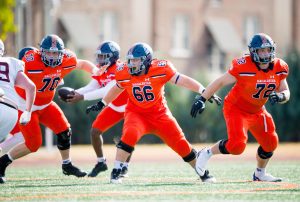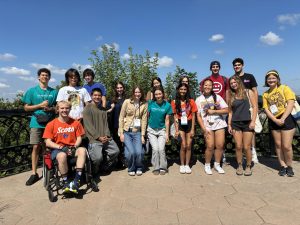Virtual Commencement, Academic Disruption and Abrupt Goodbyes for the Class of 2020
April 17, 2020
In the past few weeks, the coronavirus pandemic has upended life in various ways for the entire Macalester community. Faculty are working from home and have adjusted their classes for remote learning; students are finishing up their third week of classes by Zoom this Friday. The transition to remote learning has been a significant change and both students and faculty face a learning curve in terms of adjusting to the new conditions of college education.
Many students, including those studying abroad, are now at home, social distancing while staying with family or friends. Other students have remained on campus. Dylan Larsen ’20, a senior from Colorado studying economics and applied math and statistics, is one of these students; in talking about life on campus currently, he noted changes in Cafe Mac’s operations in accordance with social distancing guidelines.
“I like that Cafe Mac is doing takeout; they put [the food] in to-go boxes,” Larsen said. “Most of the time it’s pretty empty [but] they marked out spots for people to wait and maintain distance. It’s definitely the worst place to come into contact with someone who’s sick.”
In a zoom campus update on April 9, President Brian Rosenberg acknowledged that students staying on campus may not have the opportunity to return to their homes and are relying on the option to stay on campus through the summer.
“A majority of students who remain on campus are international. For the most part they are students who could either not return home or are concerned about returning home and not being able to get back,” Rosenberg said. “We are making sure that they are safely housed on campus and we will continue [to do] that. We will not send [away] any international student or any other student who cannot leave over the summer.”
During this time of disruption and uncertainty, Macalester’s class of 2020 is in a particularly tough spot as the meaningful culimations of their time at Macalester — commencement, senior week, performances and other events — are postponed indefinitely, changed to remote events, or cancelled outright. For many seniors, this has been a devastating blow to the end of their undergraduate careers.
“So much of what I loved about [the college experience] was being with people,” Robbie Angarone ’20 said. “It doesn’t feel as much like a change as it does like my Maclaester experience has just ended.”
For Larsen, the end of his time at Macalester likewise felt abrupt; with an uncertain future ahead, he also feels that seniors are worried about their employment prospects after college.
“Part of the struggle [is] not being able to say goodbye to people, because they just sort of disappeared,” Larsen said. “Especially for seniors, [the struggle] is very stressful… in like a month we all get to go into ‘the real world’ in the middle of record unemployment rates.”
Macalester professors and administrators are keeping the class of 2020 in mind during this difficult time of abrupt endings and goodbyes.
Beth Cleary, a professor in the theater and dance department and the director of the theater minor, has been communicating with some of her former students as she adapts her classes to remote learning.
“I did teach a first-year course four years ago, and am very aware that those seniors are graduating right now,” Cleary said. “I’ve been in touch with a few of them — five of that group are majors or minors in my department. I’ve watched them go through college, and they’re wonderful people. I feel for them; [it’s] so sad to have their last two months whisked away like this!”
Along with the emotional turmoil of the situation, some seniors are still completing their academic requirements. For seniors in some disciplines, the change means presenting capstones or honors theses through Zoom. For others, especially those in performance-based disciplines, that is simply not possible.
For seniors participating in choral activities at Macalester, the change has meant cancellations of all in-person capstone recitals, concerts and tours, including both their planned tour in San Francisco and their backup tour in Wisconsin.
Music professor and Director of Choral Activities Michael McGaghie emphasized the particular predicament his senior group faces.
“Choral music, in my vocation, is based in bringing people together to make something that goes beyond the sum of us [and] making something of beauty,” McGaghie said. “I love this class of seniors that we have between the two choirs; they’re a very special group. To lose that opportunity to complete the process of making that gift and then to share it is just impossible. That’s a significant loss.”
However, McGaghie also noted the seniors’ ability to step up and show leadership in the face of these challenges.
“Even in this state of being scattered, our seniors in the choir are doing great work to act as leaders,” McGaghie said.
Allison Leopold ’20, who participated in Concert Choir for all four of her years at Macalester, found that leading the group through the turmoil goes hand-in-hand with processing the end of her choir involvement.
“We as seniors are sort of tasked with leading the culture of choir [and] we’re not graduated, so it’s still on us to cultivate community in choir and make sure that it lasts when we are gone,” Leopold said. “We’re in this weird spot of still being peppy to keep morale up [while asking] ‘Okay, how do we sort of privately grieve our last tour?’”
In addition to singing in the Concert Choir, Leopold is also president of Macalester College Emergency Medical Services (MCEMS). While she felt connected to the MCEMS community and anticipated a tough departure, she was also looking forward to taking her Medical College Admission Test (MCAT) and applying to medical schools. Due to the coronavirus pandemic however, Leopold’s MCAT date was postponed from April 4th to May 9th.
“The main academic loss for me has been med[ical] school stuff. Now my [MCAT] score is going to come back after the application opens,” said Leopold. “I literally just don’t know if I’ll get in. A lot of people are in that boat.”
Now, Leopold faces difficult goodbyes with Concert Choir and MCEMS while also facing this uncertainty in her academic future.
“It’s weird knowing that you have to step back as a healthcare professional,” Leopold said. “Having to say goodbye has been really hard, especially because we [MCEMS] were preparing to deal with coronavirus on campus. We were fitting everyone for N95 masks and we had a protocol.”
In terms of academics, while some seniors, like Leopold, are concerned about whether they will have the opportunity to continue their education after college as planned, others are concerned with finishing up their academic requirements for their majors and minors at Macalester. For seniors participating in honors programs, the switch to online learning has still allowed them to complete and defend their honors theses virtually.
Director of Academic Programs and Advising Ann Minnick has been in contact with several seniors about finishing distribution, major and capstone requirements.
“I have been in touch with some seniors and they’ve been concerned and wondering how we’re doing [as well],” Minnick said. “For students doing honors theses, we had already discussed that when we knew this was happening. That’s a fairly easy thing to do remotely.”
However, for seniors who have yet to complete capstone presentations, whether or not they have the opportunity to do so depends on their subject matter. Nikhil Smith ’20 is one of the seniors who had their capstone presentation cancelled entirely.
“I finished my computer science capstone this past fall, before the virus swept the country,” Smith said. “But unfortunately my capstone in behavioral economics has been completely canceled because we can’t do in-person experiments. I think a lot of groups were relying on doing some sort of in-person experiment. It is what it is at this point.”
Professors across disciplines have been thinking of ways to ease the pressure for their seniors in particular and provide paths forward for completing their academic requirements. Psychology professor Morgan Jerald is having her students complete their capstones virtually, but she emphasized that this approach is not as accessible for other professors and classes.
“The [psychology] capstone course I’m teaching this semester is pretty easy to make virtual; the students in my section were planning to do online surveys,” Jerald said. “There’s another professor, Darcy Burgund, whose students were all doing neuroscience experiments that were in-person, and so that’s really unfortunate.”
“[Burgund] was actually anticipating that we were going to move online so she gave [her students] the necessary equipment they would need to run their experiments from wherever they are,” Jerald continued. “It’s definitely not turning out the way that that section had planned it.”
Overall, Jerald noted that professors seem to be on the same page when it came to supporting their students through this tough time.
“I think across the board, most professors are trying to seek a place to reduce students’ workload or lessen some other expectations and we’re thinking about that with the capstones too,” Jerald said. “We want [students] to get through the capstone successfully and obviously no one planned for this to happen.”
Along with shouldering these academic burdens, seniors are also worried about the status of their commencement — a milestone they have anticipated and worked towards for years. Prior to President Rosenberg’s virtual campus update April 9, there was no finalized plan for commencement; the only certainty was that it would not be an in-person commencement in May, as previously planned.
On Monday, March 30, President Brian Rosenberg shared a video online with the Macalester community addressing concerns about commencement.
“We are so sorry that you will not be able to have the celebrations and the ceremonies… and especially the graduation that all of you want and that all of you have earned,” Rosenberg said in the video. “This is what I promise you — we will figure out something else. We will honor you in the way that you deserve.”
Donna Lee, the vice president for student affairs, reiterated that commencement planning is underway in an email to The Mac Weekly.
“As I am sure you can imagine this is a hectic time, and we are all running at full sprint to ensure student welfare,[that] needs are met, and that this transition to a new way of teaching, learning, engagement is as smooth and effective as it can be,” Lee said. “Regarding commencement, we are committed to figuring out how to honor our seniors, and planning is underway.”
On April 9, President Brian Rosenberg followed up on his promise, announcing that the commencement ceremony meant to take place this May has been cancelled and will be replaced by a virtual ceremony.
“We will not let this milestone go unmarked. We will be announcing as soon as possible what our plans are for [a] virtual commencement that is as meaningful and as personal for our seniors as possible,” Rosenberg said. “Our hope is also then, at some point in the future, to bring [the seniors] back to campus so that they can have a celebration that is more like a traditional celebration.”
Although they believe that commencement and graduation are meant to be meaningful, in-person culminations to the undergraduate experience, the seniors are understanding of the situation and look forward to taking in more information as it comes.
“Even if commencement is remote, I think that that recognition would be a good thing because for three and a half [to] four years in college, we finally want to have some closure in the end,” Smith said. “Even if commencement doesn’t happen physically, I think that a digital ceremony would be really good for us.”
For others, an in-person ceremony at a later time is the ideal solution.
“I think among friends the preferred option is a postponed [in-person] commencement next year or as soon as it’s safe. That would be perfect — or as close to perfect as we can manage,” Angarone said. “I’m not super enthusiastic about doing a digital commencement, but it is better than nothing. I’m not frustrated with Brian Rosenberg or anything like that. [Those planning commencement] don’t really have a choice.”
Amid these difficulties, faculty, students, and administrators have been resilient and consistent in sustaining community from wherever they are. From launching virtual events and Zoom meetups to dialing down student workload, virtually everyone has been adjusting to new circumstances.
“I think everybody’s trying to do the best they can and [the seniors] recognize that it’s nobody’s fault — it just happened,” Minnick said. “I feel like students have been quite gracious and understanding, although I’m sure they’re anxious and disappointed.”













